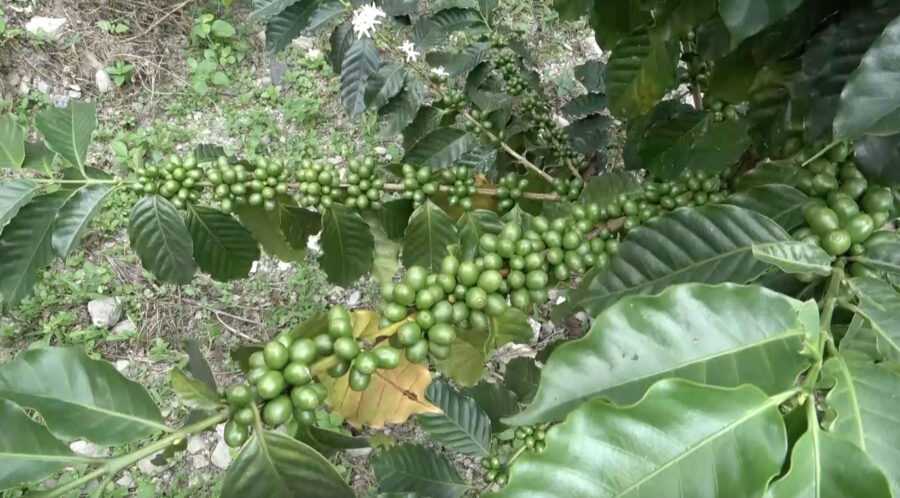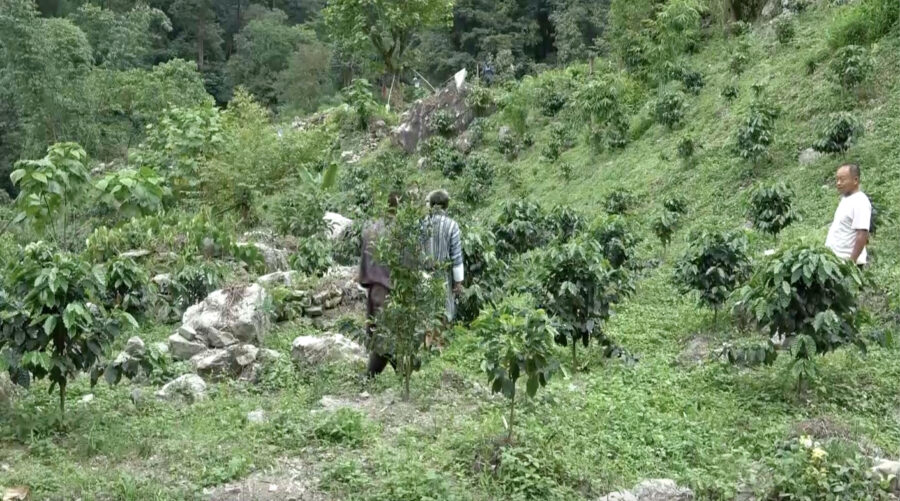 Chhoekhorling Gewog in Pema Gatshel is witnessing a shift in farming practice as more farmers embrace coffee cultivation. Once a pilot initiative, coffee is now emerging as a promising cash crop in the gewog. Several villages have already seen their first successful harvest just two years after planting. Following assurance that market access will no longer be a hurdle, two more chiwogs have started mass plantation this year.
Chhoekhorling Gewog in Pema Gatshel is witnessing a shift in farming practice as more farmers embrace coffee cultivation. Once a pilot initiative, coffee is now emerging as a promising cash crop in the gewog. Several villages have already seen their first successful harvest just two years after planting. Following assurance that market access will no longer be a hurdle, two more chiwogs have started mass plantation this year.
The lush coffee plants in Gazawung village of Chhoekhorling Gewog are now bearing fruit. The saplings, distributed two years ago, are finally rewarding the farmers’ hard work and dedication.
The gewog administration identified suitable locations for planting and launched a pilot project with support from the Bhutan Ecological Society.
“The altitude in Gazawung chiwog is highly suitable for coffee. We plan to plant over 500 acres with the support of Mountain Coffee. Once they begin operations here, it will bring the market right to the farmers’ doorsteps,” said Kunzang Rabten, Chhoekhorling Gup, Pema Gatshel.
Joy is evident on the faces of the villagers. Their satisfaction is growing along with their crops, and they are hopeful for a steady income. With the first fruits now appearing, farmers are more committed than ever.

“Our orange trees have dried up. When we approached Minister Karma Dorji, he promised coffee saplings, and we received them. We’re still learning about the market, but the gup and agriculture officials have assured us of their support,” said Cheten Dorji, Coffee Grower, Gazawung, Chokhorling Gewog, Pema Gatshel.
“This plant fruits faster than many others. I’ve planted about 1,500 this year alone. Last year, a representative from a coffee company visited and told us to plant as much as we can, and he would buy everything,” said Sangay Nidup, Coffee Grower, Gazawung, Chhoekhorling Gewog, Pema Gatshel.
The gewog administration is determined not to let this opportunity fade. They plan to expand coffee cultivation to around 500 acres and continue supplying free saplings to encourage more farmers to cultivate it.
“Following the successful pilot, we’ve already distributed 25,000 saplings this year to Gazawung, Yarjaywung, and Dizama chiwogs,” said Kunzang Rabten, Chhoekhorling Gup, Pema Gatshel.
Before Gazawung, Arden-Khalatsho chiwog had shown early success in coffee cultivation.
However, a lack of manpower stalled the mass plantation. Now, with renewed momentum, Dizama and Yarjaywung chiwogs have taken the lead, and Arden-Khalatsho is preparing for future expansion.
“Officials from Mountain Coffee have visited and assured us they will buy our harvests. They even promised to send vehicles to collect the produce directly from our villages,” said Tshejay Norbu, Dizama-Shuguri Tshogpa, Chokhorling Gewog.
“I’ve had a coffee plant at Alabara for two years, already bearing fruit. We weren’t doing much with it, but now that the company promised to buy from us, I’m eager to grow more and earn from it,” said Rinchen Lhamo, Coffee Grower, Dizama, Chhoekhorling Gewog, Pema Gatshel.
“Once the Nganglam-Dewathang highway is complete, I hope villagers will return. When they do, I’ll encourage them to cultivate coffee in our area,” said Sangay Dorji, Khalatsho-Arden Tshogpa, Chhoekhorling Gewog, Pema Gatshel.
Farmers are also beginning to produce seeds on their own to increase the cultivation. Over 100 households, across three chiwogs, have already adopted coffee farming.
If production continues to increase, Bhutan Mountain Coffee has pledged to establish a collection yard in Nganglam. Farmers hope to start selling their produce as early as possible this year.
Thinley Dorji, Pema Gatshel
Edited by Phub Gyem










